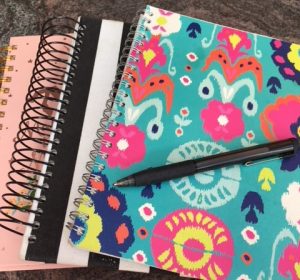My journey in journaling
 The topic of journaling recently came up at the weekly Write on Site writing group led by author, coach and workshop leader Meggin McIntosh. I have been keeping an almost-daily journal off and on for more than five years, and it’s become not just a part of my life or a therapeutic exercise, but an unexpectedly rewarding benefit — in surprising ways.
The topic of journaling recently came up at the weekly Write on Site writing group led by author, coach and workshop leader Meggin McIntosh. I have been keeping an almost-daily journal off and on for more than five years, and it’s become not just a part of my life or a therapeutic exercise, but an unexpectedly rewarding benefit — in surprising ways.
I started journaling in an effort to regain a semblance of sanity after I had fractured my spine in a freak workout accident. During my months-long recovery, which included surgery, I spent hours alone, ensconced in bed or on couch and at times in miserable pain. I turned to journaling for the first time since I had kept a drama-loaded lock-and-key diary during my adolescence. My overwrought confessions of junior high school crushes likely served some small purposes of self-awareness and emotional growth, but it also made me happy to have the excuse simply to write my crushes’ names (here’s to you, Mike and Ray) and store my secrets in a hidden place.
My recovery journal was different, however. I desperately needed a place to write, in screamingly dark ink, thoughts such as “Oh my God, why me?” so that I wouldn’t repeat them endlessly to my family and friends. My original inspiration was Marie Gibson, Reno-based business consultant and creator of The Caregiver’s Journal, which organizes thoughts and notes during any time of illness or hospitalization. My daughters made the first entries, and then, one day-post surgery, I started making notes on my medical conversations with nursing staff and physicians (“Dr. Demers was happy with my incision!”), hopes and prayers (“…for mental and physical strength”) and friends who visited in the hospital and at home, bearing sumptuous dishes and good wishes. I hoped to thank them all, to send notes to each and every one – and ultimately did.
Recognizing the limitations of keeping a journal of my medical trials, I turned to recording specific areas and occurrences that inspired gratitude (“My family. My friends, dozens who visited, sent flowers and cards. The ability to create my own happiness.”)
I would like to proudly affirm that I have journaled continuously since the fateful months following the crushing of my fourth lumbar and insertion of plastic rods to make me an upright human again. The reality is that after six months of recording my hopes, fears and wild psychological swings, I took a two-and-a-half-year hiatus, with the exception of compulsively keeping travel journals.
More than two years after my last recovery entry, I stood at the precipice of retirement from my full-time job. I contemplated life sans career after those years of blessedly semi-normal existence post-surgery. My inspirations for this next act included Oprah, who famously has maintained a two-decade-long gratitude journal practice (five things for which she is grateful every day) and Meggin McIntosh, whose creative webinar based on the book Part Wild by Deb Norton offers a rich array of writing revelations.
As Oprah said in The Wisdom of Sundays, “It sounds simple, but when you go through the day staying conscious about what you will put on your gratitude list, it completely shifts the lens through which you see the world.” Meggin McIntosh encourages writers to list the actions and environments that inspire their creativity, to declare their intentions and “come out” as creatives.
I restarted my journal with a regular recording of gratitude, at first setting standards (five to ten daily). I ultimately relinquished those limitations and incorporated gratitude into other intentions of journaling that I believe form the soul of this daily discipline:
- Achieving goals – Journaling is an effective way to record and pursue goals, from small personal objectives and travel aspirations to major life goals.
- Spiritual growth – Keeping a journal is a helpful resource for living the examined life. Writing each day leads to exploring the larger questions of human existence: What is my purpose, and am I fulfilling it? How can I be more positively self-aware while letting go of the obstructive ego? How can I be more present and connected to God, the beauty in the world and all people?
- Organizing thoughts amid the chaos – Our lives often are rushed, crammed with distractions and a confusion of issues. Writing about the seeming absurdity and disorder can help clarify the meaning of events and conversations.
- Honest expression – We can’t always say exactly what we’re thinking if we want to preserve relationships. Writing down frank thoughts about happenings is healthier than confrontation or negative reactions – or can help sort out what to say once the flames of temper have cooled.
- Letting it go – As a corollary to the above, journaling can lend perspective and balance when anger and resentment are seething. Writing it down makes it easier to view negative situations objectively and move on.
- Stoking creativity – Adding a daily page for freeform thoughts without self-censorship or editing, whether ideas for your next article, blog or book, or as an exercise, helps to keep that right side of the brain firing.
- Vocabulary stretch – Daily writing challenges word choices and sentence construction. It’s an opportunity to think of memorable metaphors and vivid descriptions without self-judgment.
- Never forget – If you’ve ever had this thought and then promptly lost exactly what it is you determined must be remembered – and who hasn’t? – you know the human brain can’t retain all of those images or words we would like to instantly retrieve. A journal is the perfect place to keep quotes, conversational nuggets or interesting incidents for future reference.
Finally, a word on equipment: Find your perfect journal and pen. Spiral binding in a 6” x 8” notebook with satisfyingly thick lined paper and a gel-type black-ink pen are my ideal tools. It helps to be happy with the basics before reflecting and creating in a journal that is uniquely yours.





